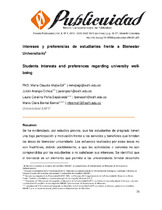| dc.contributor.author | Mejía-Gil, María Claudia | |
| dc.contributor.author | Arango-Ochoa, Julián | |
| dc.contributor.author | Peña Sepúlveda, Laura Catalina | |
| dc.contributor.author | Bernal Bernal, María Clara | |
| dc.coverage.spatial | Seccional Medellín | spa |
| dc.date.accessioned | 2021-01-27T20:15:22Z | |
| dc.date.available | 2021-01-27T20:15:22Z | |
| dc.date.issued | 2018 | |
| dc.identifier.uri | http://hdl.handle.net/20.500.11912/7671 | |
| dc.description | p. 36 - 57 | spa |
| dc.description.abstract | Se ha evidenciado, por estudios previos, que los estudiantes de pregrado tienen una baja participación y motivación frente a los servicios y beneficios que brindan las áreas de bienestar universitario. Los esfuerzos realizados por estas áreas no son fructíferos, debido posiblemente, a que las actividades o servicios no son comprendidos por los estudiantes o no satisfacen sus intereses. Se identificó que el bienestar es un elemento que permite a las universidades brindar desarrollo humano a su comunidad, sin embargo, en muchas ocasiones es visto de manera asistencialista, satisfaciendo principalmente necesidades económicas. La presente investigación consiste en la identificación de los gustos, preferencias e intereses de los estudiantes de pregrado de una universidad privada de la ciudad de Medellín, en cuanto a servicios de bienestar universitario, para mejorar la oferta de los mismos. Para apoyar esta investigación, desde el marco teórico se trataron temas relacionados con el bienestar universitario, cómo se lleva a cabo en las universidades y qué factores perciben los estudiantes que influyen en su bienestar. El proyecto se ejecutó con un método mixto, con la técnica de sesiones de grupo y con la aplicación de una encuesta. Como principales resultados se encontró que la mayoría de los estudiantes no usan los servicios que ofrece el área por falta de conocimiento, sin embargo los estudiantes que han asistido afirman que los servicios ofrecidos por el área de Bienestar Universitario son buenos y satisfacen sus necesidades; adicionalmente, prefieren que los servicios se comuniquen por medios alternativos como actividades en lugares con alta concentración de personas y redes sociales. Adicionalmente los estudiantes asocian el bienestar con factores de carácter personal y social más que académico por lo que se proponen actividades que fomenten su desarrollo personal, social y ciudadano. | spa |
| dc.description.abstract | It has been shown, from previous studies, that undergraduate students in local universities have low participation and motivation regarding the services and benefits offered by their well-being1 centers. The work done by these centers seem not to be very successful; presumably, students do not fully understand the activities or services offered, or they do not satisfy their interests. It was found that a focus on well-being allows universities to foster human development within their community and that is the reason why well-being centers exist. However, in many cases, these centers are viewed narrowly, providing mainly economic assistance. The present research aims to identify the tastes, preferences, and interests of this population of students of a private university in the city of Medellín, regarding the services of its well-being center. This effort looks to contribute to the improvement of the well-being center value offer. We investigated aspects such as what is university welfare, how this is achieved (or attempted to be achieved) and what factors the students do perceive relevant for their well-being at the university. The project was carried out through qualitative technique by conducting group sessions, and a quantitative technique (survey). We found that most students do not use well-being center services due to lack of knowledge; however, students who have used the services indicate they are right and indeed meet their needs. Additionally, students say they prefer alternative means to know about the services, such as activities in places with a high concentration of people and online social networks. Furthermore, students associate well-being with personal and social factors rather than academic, so activities are proposed that promote their personal, social and citizen development. | spa |
| dc.format.mimetype | application/pdf | |
| dc.language.iso | spa | |
| dc.publisher | Universidad Pontificia Bolivariana | spa |
| dc.relation.ispartof | Publicuidad | spa |
| dc.rights | Attribution-NonCommercial-NoDerivatives 4.0 International | * |
| dc.rights.uri | http://creativecommons.org/licenses/by-nc-nd/4.0/ | * |
| dc.subject | Bienestar universitario | spa |
| dc.subject | Desarrollo humano | spa |
| dc.subject | Preferencias; percepción | spa |
| dc.subject | University well-being | spa |
| dc.subject | Human development | spa |
| dc.subject | Preferences | spa |
| dc.subject | Perception | spa |
| dc.title | Intereses y preferencias de estudiantes frente a Bienestar Universitario | spa |
| dc.title.alternative | Students interests and preferences regarding university wellbeing | spa |
| dc.type | article | spa |
| dc.rights.accessRights | openAccess | spa |
| dc.type.hasVersion | publishedVersion | spa |
| dc.description.sectional | Medellín | spa |
| dc.identifier.instname | instname:Universidad Pontificia Bolivariana | spa |
| dc.identifier.reponame | reponame:Repositorio Institucional de la Universidad Pontificia Bolivariana | spa |
| dc.identifier.repourl | repourl:https://repository.unab.edu.co/ | |


